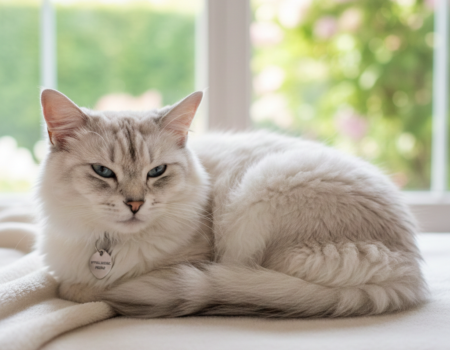“The greatness of a nation can be judged by the way its animals are treated.” – Mahatma Gandhi
Hello, fellow feline lovers! Today, I want to dive into a topic that doesn’t often get discussed: kennel cough in cats. While it’s more commonly associated with our canine companions, cats can also fall victim to this respiratory infection. So, let’s explore the world of feline kennel cough, from symptoms and treatment options to prevention tips and whether it’s contagious to us humans.
Key Takeaways:
- Contrary to popular belief, cats can indeed get kennel cough.
- Kennel cough is caused by the bacteria Bordetella bronchiseptica.
- Common symptoms in cats include coughing, sneezing, and runny nose.
- Treatment options include antibiotics, cough suppressants, and immune system supplements.
- Prevention measures include vaccination and good overall health.
How Do Cats Get Kennel Cough?
Cats can contract kennel cough from infected dogs and other cats. The transmission of kennel cough occurs through nasal and oral secretions, direct contact, and shared objects such as water bowls or toys. Cats that are most at risk of exposure include those in crowded conditions such as shelters or pet stores, cats living with other pets who have been exposed to kennel cough, and cats who frequently travel, go outdoors, or are frequently exposed to other pets.
Moreover, certain risk factors such as stress, poor ventilation, and smoke exposure can weaken a cat’s immune system, making them more susceptible to infectious respiratory diseases. It is crucial to keep cats in good overall health to reduce their risk of kennel cough and other respiratory infections. Vaccinating cats for other common respiratory diseases and keeping them indoors can also help prevent the spread of kennel cough.
Risk Factors for Cats Getting Kennel Cough
| Risk Factors | Description |
|---|---|
| Crowded conditions | Cats in shelters or pet stores |
| Exposure to infected pets | Cats living with infected dogs or cats |
| Frequent travel or outdoor access | Cats who travel or have outdoor exposure |
| Stress, poor ventilation, and smoke exposure | Conditions weakening the feline immune system |
By understanding the modes of transmission and the risk factors associated with kennel cough, cat owners can take proactive measures to protect their feline companions and reduce the incidence of this respiratory infection.
Can Kennel Cough Spread Between Cats, Dogs, and Humans?
Kennel cough is not limited to dogs; it can also spread between cats, dogs, and humans. Transmission of kennel cough can occur through direct contact with infected animals or contaminated objects. Cats can contract kennel cough from infected dogs and other cats, while dogs can also catch it from cats. Although rare, humans can become infected with kennel cough when in close contact with infected dogs or cats. However, it is important to note that the transmission of kennel cough from animals to humans, known as zoonotic transmission, is extremely unlikely to cause serious illness in individuals with a healthy immune system.
The transmission of kennel cough is primarily through respiratory secretions, such as saliva and nasal discharge, which contain the bacteria Bordetella bronchiseptica. When an infected animal coughs or sneezes, these droplets can be released into the air and contaminate surfaces, such as hands, clothing, or objects.
Practicing good hand hygiene is crucial in preventing the spread of kennel cough between animals and humans. After coming into contact with an infected dog or cat, it is important to wash hands thoroughly with soap and water for at least 20 seconds. Using hand sanitizers containing at least 60% alcohol can also be effective in killing bacteria.
It is essential to note that transmission of kennel cough to humans is rare and highly unlikely to cause severe illness, especially in individuals with a healthy immune system. However, for immunocompromised individuals or those with underlying health conditions, additional precautions may be necessary. Consulting with a physician can provide guidance and recommendations for those who may be more vulnerable to infections.
Remember, being mindful of hand hygiene and regular handwashing after interacting with pets can go a long way in preventing the transmission of kennel cough and other bacterial infections.
Summary of Transmission:
The table below summarizes the transmission of kennel cough between cats, dogs, and humans:
| Cats | Dogs | Humans | |
|---|---|---|---|
| Can Cats Get Kennel Cough? | Yes, from infected cats and dogs | Yes, from infected cats and dogs | Extremely rare, from infected cats and dogs |
| Can Dogs Get Kennel Cough? | Yes, from infected cats and dogs | Yes, from infected cats and dogs | Yes, from infected cats and dogs |
| Can Humans Get Kennel Cough? | No documented cases | Uncommon, extremely rare | Uncommon, extremely rare |
| Transmission Route | Direct contact with infected cats or dogs | Direct contact with infected cats or dogs | Direct contact with infected cats or dogs or contaminated surfaces |
Common Symptoms of Kennel Cough in Cats
When your beloved feline companion starts exhibiting unusual symptoms, it can be a cause for concern. It’s essential to recognize the common symptoms of kennel cough in cats, as early detection can lead to timely treatment and a faster recovery. These symptoms can include:
- Coughing: Cats affected with kennel cough may present with bouts of coughing. The cough may sound dry, hacking, or honking, similar to the sound observed in dogs.
- Sneezing: Cats may also experience sneezing, especially when the infection affects their upper respiratory tract.
- Runny nose: The presence of a runny nose, accompanied by clear or slightly discolored discharge, may indicate a respiratory infection.
- Eye discharge: Some cats with kennel cough may also develop eye discharge, which can range in consistency from watery to thick and purulent.
- Lethargy: Cats with kennel cough may appear more lethargic or less active than usual, exhibiting a lack of energy and enthusiasm.
- Fever: A mild to moderate elevation in body temperature is another common symptom of kennel cough in cats.
- Loss of appetite: Cats may exhibit a decreased interest in food or refuse to eat altogether as a result of the illness.
- Difficulty breathing: In severe cases, kennel cough can lead to respiratory distress and difficulty breathing, necessitating immediate veterinary attention.
It is worth noting that these symptoms are not exclusive to kennel cough and can also be indicative of other respiratory infections, asthma, heart disease, infections, parasites, allergies, or even hairballs. Therefore, consulting a veterinarian is crucial to determine the cause of the symptoms and provide the appropriate treatment.
When Is a Vet Visit Needed for Kennel Cough in Cats?
If your cat is showing symptoms of kennel cough, it is important to schedule a vet visit as soon as possible. While kennel cough is usually a mild disease in cats, there are certain circumstances when immediate veterinary attention is needed.
Risk Factors for Severe Disease
Some cats, such as young kittens, older cats, and those with compromised immune systems, are more susceptible to severe forms of kennel cough. If your cat falls into one of these categories, it is essential to seek veterinary care promptly.
Severe Kennel Cough and Pneumonia
In some cases, kennel cough can progress to pneumonia, which can be life-threatening for cats. If your cat is very ill, weak, or experiencing difficulty breathing, it is crucial to seek emergency veterinary care.
Other Causes of Cough in Cats
Although kennel cough is a common cause of coughing in cats, there are other potential reasons for coughing as well. These can include asthma, heart disease, other types of infections, parasites, and allergies. A veterinarian will be able to evaluate your cat and determine the underlying cause of the cough.
Remember, as a pet owner, you are in the best position to recognize changes in your cat’s behavior and health. If you notice any coughing or respiratory symptoms, don’t hesitate to reach out to your veterinarian for guidance and appropriate treatment.
| Vet Visit Needed | Emergency Vet Visit Required | Other Causes of Cough |
|---|---|---|
| If cat is very ill or having difficulty breathing | If kennel cough progresses to pneumonia | Asthma, heart disease, other infections, parasites, allergies |
| Young kittens, older cats, and those with compromised immune systems |
How Is Kennel Cough Diagnosed in Cats?
Diagnosing kennel cough in cats involves a thorough veterinary examination, medical history review, and diagnostic testing. When a cat presents with symptoms indicating a respiratory infection, the veterinarian will conduct a physical exam to assess the cat’s overall health and identify specific respiratory signs.
The physical exam may reveal symptoms such as coughing, sneezing, nasal discharge, and other respiratory abnormalities. While these symptoms can indicate kennel cough, further testing is often necessary to confirm the diagnosis and rule out other underlying conditions or infections.
Diagnostic testing for kennel cough in cats may include the following:
- Bloodwork: A complete blood count (CBC) and blood chemistry analysis can provide insights into the cat’s overall health, detect any abnormalities, and assess the presence of infection or inflammation.
- X-rays: Radiographs of the chest can help visualize the lungs and detect any abnormalities, such as pneumonia or lung consolidation.
- Swab culture: Nasal or throat swabs may be taken to test for infectious diseases, such as Bordetella bronchiseptica, which is the bacteria commonly associated with kennel cough.
- Other tests: Additional tests, such as polymerase chain reaction (PCR) testing or antibody testing, may be performed to identify specific pathogens causing respiratory infections in cats.
In some cases, the cat’s medical history, symptoms, and physical examination findings may be sufficient to initiate treatment for respiratory infections. However, if the cat has recurring respiratory infections, severe symptoms, a lack of response to treatment, or the possibility of an underlying condition like asthma, further diagnostic testing may be recommended.
It is important to consult with a veterinarian who specializes in feline health to determine the appropriate diagnostic approach and guide the treatment plan.
Treatment Options for Kennel Cough in Cats
When it comes to treating kennel cough in cats, there are several options available to help alleviate symptoms and support their recovery. The specific treatment approach will depend on the severity of the symptoms and the overall health of the cat.
Antibiotics for Cats
If the kennel cough in cats is caused by a bacterial infection, antibiotics may be prescribed by a veterinarian. Antibiotics help to eliminate the bacteria and prevent the infection from spreading. It’s important to follow the prescribed dosage and complete the full course of antibiotics to ensure effective treatment.
Cough Suppressants for Cats
Cough suppressants can be used to reduce coughing and provide relief to cats with kennel cough. These medications help to suppress the urge to cough, allowing the throat and respiratory tract to heal. It’s important to note that cough suppressants should only be used under the guidance of a veterinarian, as some over-the-counter medications can be toxic to cats.
Immune System Supplements for Cats
Supporting the cat’s immune system can help boost their overall health and facilitate recovery from kennel cough. Immune system supplements, such as vitamin C or immune-boosting herbs, may be recommended by a veterinarian. These supplements can help strengthen the cat’s immune response and aid in fighting off the infection.
Hospitalization for Severe Cases
In severe cases of kennel cough, especially those complicated by pneumonia, hospitalization may be necessary. Hospitalization allows for more intensive care and monitoring, including administration of intravenous fluids, oxygen therapy, and close observation by veterinary professionals. Hospitalization is especially important for young kittens, older cats, and those with compromised immune systems.
It’s important to consult with a veterinarian before administering any medications or supplements to a cat at home. Cats are highly sensitive to certain medications, and some can be toxic to their system. A veterinarian will recommend the most appropriate treatment plan based on the cat’s specific needs, ensuring their safety and well-being.
Image:
Helping Your Cat Feel Better at Home
When your cat is suffering from kennel cough, there are several steps you can take at home to provide comfort and support their recovery. Creating a comfortable environment is crucial for their well-being. Set up a quiet space away from other pets and children, where your cat can rest undisturbed. This will help reduce stress and aid in their recovery.
In addition, it’s important to isolate your sick cat to minimize the spread of kennel cough to other pets in your household. This can be accomplished by keeping them in a separate room or area until they have fully recovered.
Make sure your cat has access to plenty of fresh drinking water. Cats with kennel cough may experience a decreased appetite, so consider offering soft foods or tempting treats to entice them to eat. Maintaining their hydration and nutrition is essential for their recovery.
A humidifier can be a helpful tool in relieving your cat’s respiratory symptoms. By adding plain water or saline to the humidifier, you can help soothe their irritated airways and make breathing more comfortable.
Supportive care is also important in helping your cat feel better. Provide them with a comfortable resting place, such as a cozy bed or blanket, where they can relax and recover. Show them plenty of love and attention, offering gentle petting and reassurance to help alleviate their stress and promote healing.
By following these home care tips and providing the necessary support, you can help your cat feel better and aid in their recovery from kennel cough. Remember to consult with your veterinarian for specific guidance tailored to your cat’s individual needs.
Conclusion
Kennel cough in cats, although less common than in dogs, is a potential health concern for our feline companions. Caused by the bacteria Bordetella bronchiseptica, this infectious respiratory disease can be transmitted through direct contact with infected cats or dogs, as well as shared objects.
While kennel cough is typically a mild illness in cats, certain high-risk individuals, such as young kittens, older cats, and those with weakened immune systems, are more susceptible to severe complications. It is crucial to seek veterinary care if your cat shows symptoms of kennel cough, as other respiratory diseases and underlying conditions can present with similar signs.
Treatment options for kennel cough in cats include antibiotics to address bacterial infections, cough suppressants to alleviate coughing, and immune system supplements to support recovery. Alongside medical intervention, creating a comfortable environment at home and providing supportive care, such as fresh water, soft foods, and a humidifier, can aid in your cat’s healing process.
To prevent kennel cough and protect our feline friends, it is important to prioritize preventive measures, including vaccination and maintaining good overall health. Understanding the symptoms, seeking veterinary care, and practicing good hygiene, such as regular handwashing, are essential in safeguarding the well-being of our beloved cats.
FAQ
Can cats get kennel cough?
Yes, cats can get kennel cough, although it is less common in cats than in dogs. Kennel cough is an infection of the throat and upper respiratory tract, and cats can contract it from infected dogs or other cats.
How do cats get kennel cough?
Cats can get kennel cough from infected dogs and other cats. The disease can be transmitted through nasal and oral secretions, direct contact, and shared objects such as water bowls or toys.
Can kennel cough spread between cats, dogs, and humans?
Yes, kennel cough can spread between cats, dogs, and humans. Cats can get kennel cough from infected dogs and other cats, while dogs can also catch it from cats. Although rare, humans can contract kennel cough from infected dogs or cats, but it is unlikely to cause serious illness in individuals with a healthy immune system.
What are the common symptoms of kennel cough in cats?
Common symptoms of kennel cough in cats include coughing, sneezing, runny nose, eye discharge, lethargy, fever, loss of appetite, and difficulty breathing in severe cases.
When is a vet visit needed for kennel cough in cats?
A vet visit is needed for kennel cough in cats as soon as possible, especially if the cat is very ill or having difficulty breathing. While kennel cough is usually mild, it can progress to pneumonia and be fatal, especially in young kittens, older cats, and those with compromised immune systems.
How is kennel cough diagnosed in cats?
Kennel cough in cats is diagnosed by a veterinarian through a physical examination, medical history review, and diagnostic testing. Additional tests such as bloodwork, x-rays, and swabs may be necessary for a definitive diagnosis.
What are the treatment options for kennel cough in cats?
Treatment options for kennel cough in cats include antibiotics to treat bacterial infections, cough suppressants to alleviate coughing, and immune system supplements to support their recovery. Severe cases may require hospitalization and more intensive care.
How can I help my cat feel better at home if they have kennel cough?
You can help your cat feel better at home by creating a comfortable environment, providing a quiet place away from other pets and children. Isolating a sick cat can help prevent the spread of kennel cough. Keep plenty of fresh drinking water available and consider offering soft foods or tempting treats if the cat’s appetite is decreased. Using a humidifier with plain water or saline can help relieve respiratory symptoms, and supportive care and TLC can aid in the cat’s recovery.
Can kennel cough be prevented in cats?
While it is difficult to completely prevent kennel cough in cats, you can lower their risk by keeping them in good overall health, vaccinating them for other common respiratory diseases, and keeping them indoors to minimize exposure to other pets.










No Comment! Be the first one.